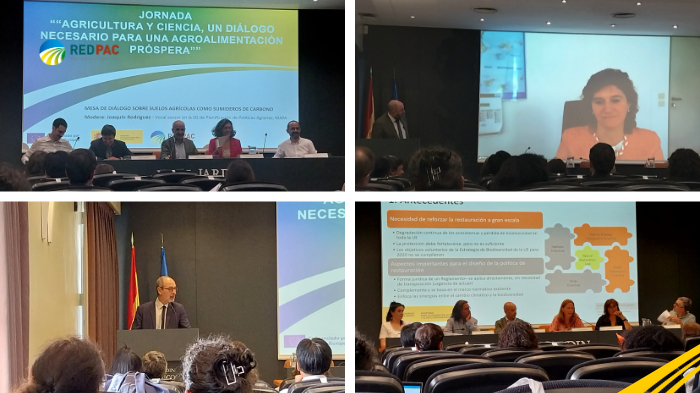
04 de July de 2025
The PAC Network organized the conference "Agriculture and Science, a Necessary Dialogue for a Prosperous Agri-Food Sector," the result of an agreement between the Ministry of Agriculture, Fisheries and Food and the Spanish National Research Council (CSIC).
- The PAC Network organized the conference "Agriculture and Science, a Necessary Dialogue for a Prosperous Agri-Food Sector," the result of an agreement between the Ministry of Agriculture, Fisheries and Food and the Spanish National Research Council (CSIC).
- The objective was to show the work carried out by the CSIC to date within the framework of the Agreement, as well as the approach to future work until its completion.
Science and agriculture sat down for a dialogue in the green heart of Madrid. On June 10, the Royal Botanical Garden hosted the conference "Agriculture and Science, a Necessary Dialogue for a Prosperous Agri-Food Sector ," organized by the Ministry of Agriculture, Fisheries and Food (MAPA) in collaboration with the Spanish National Research Council (CSIC) . The event brought together expert voices from the scientific, technical, and institutional fields, as well as professionals from the sector, to explore how the knowledge generated by science applied to the agricultural sector contributes to achieving a more competitive, sustainable, and fair agri-food system, aligned with the values of the Strategic Plan for the CAP in Spain (PEPAC) .
In September 2022, the CSIC became the scientific advisor for the evaluation of the new PEPAC in Spain through a collaboration agreement with the MAPA (Spanish Agricultural Research Council) to provide scientific advice on the PEPAC, from a triple perspective: environmental, economic, and social, in accordance with the new CAP regulations. The agreement also included other tasks not only related to the evaluation but also to training and communication.
Program
Following the official opening, the first part of the session featured an explanation of the new " Vision for European Food and Agriculture " for the agri-food system in 2040, with a presentation by Elvira Bakker, Head of Unit at the European Commission's Directorate-General for Agriculture. The role of the PEPAC as a guarantor of ecosystem services was then discussed, beyond its fundamental role in agri-food production.
Following the presentation of ongoing and future evaluation activities within the framework of the PEPAC Evaluation Plan , the IEGD-CSIC presented the results of the evaluation support work in the economic field of PEPAC carried out to date.
The presentations gave way to two roundtable discussions : one on "agricultural soils as carbon sinks" and another on "the alliance between agriculture and biodiversity."
During the day, concrete examples were discussed of how science can be translated into practical solutions for the agricultural sector. All of this was achieved with a common goal: to ensure that research flows from laboratories to farms, and that innovation is an accessible ally for all stakeholders in the agri-food system.
Agreement
The signing of the agreement was the origin of the creation of an Interdisciplinary Thematic Platform , called CSIC (PTI) AGRIAMBIO , which has allowed, in addition to the participation of research centers and organizations attached to the CSIC itself as listed in the agreement itself such as INIA , MNCN and the IEGD , that of others such as the EBD , IREC , EEZA , CREAF and the IMIB , and even specific collaborations with universities and NGOs.
Within the framework of the agreement, the CSIC has actively participated in providing scientific advice on activities related to:
- Biodiversity and ecosystem services, highlighting the preparation of the ex-post evaluation of the PEPAC with the design of sampling protocols to assess the impact of the PEPAC on biodiversity indicators such as the indicator of agricultural birds in plots under ecoregimes or the effect of the PEPAC on species and habitats protected by Directives.
- Greenhouse gas (GHG) mitigation through soil organic carbon (SOC) estimation. In this area, the design of a sampling protocol to assess the real impact of ecoregimes on SOC is highlighted, with soil sample analysis from 16,000 plots in collaboration with several entities (AGROSEGURO, SG Análisis, Coordinación y Estadística, and TRAGSA).
- Socioeconomic objectives include updating farms' economic indicators following events such as the drought, the war in Ukraine, or COVID-19, analyzing farms' cost structures, and developing models to determine the impact of CAP aid on the income of industry professionals.
The agreement, which has a budgeted cost of €1,800,000 for the entire period, has a duration of three years, from September 2022 to September 2025.
The conference program can be found here, along with all the presentations.











